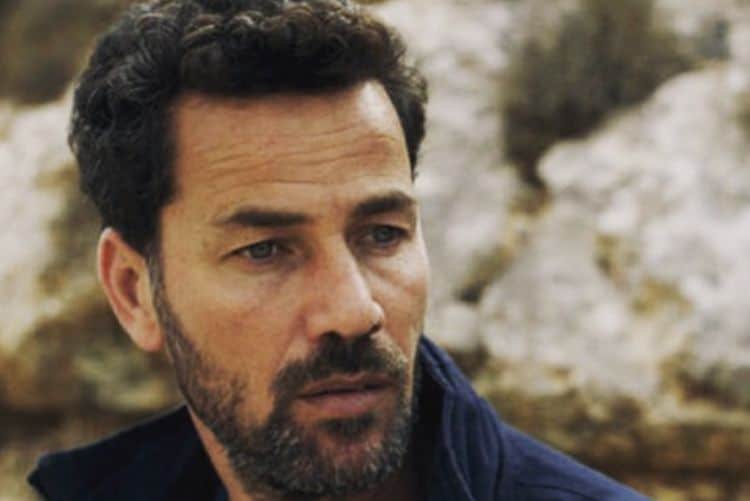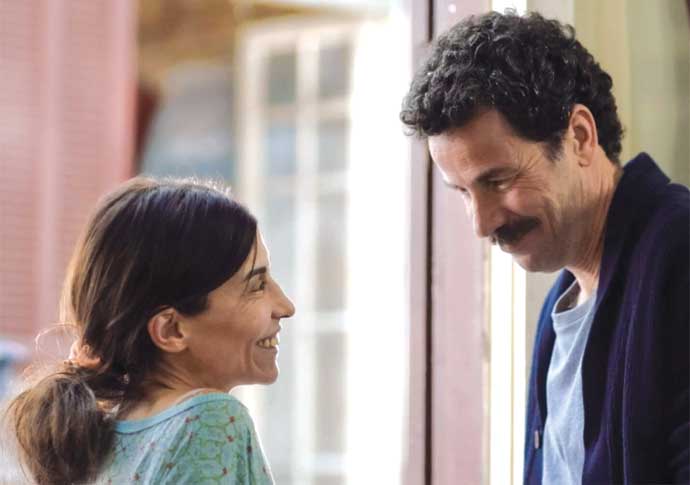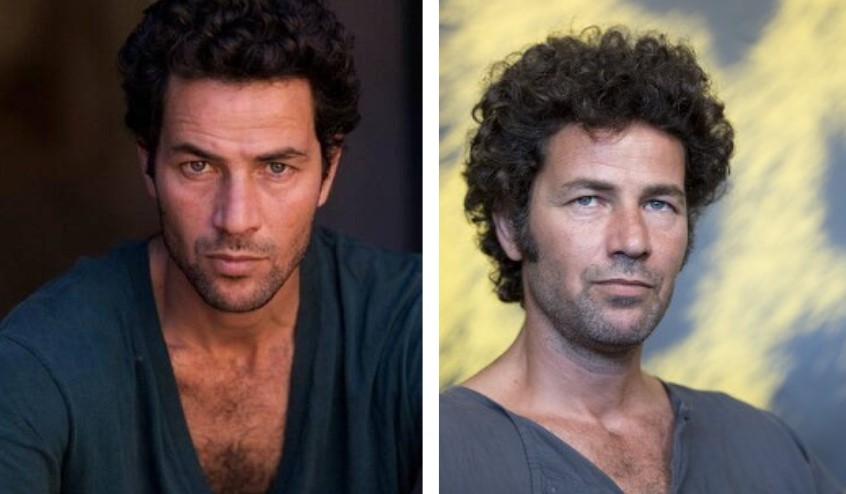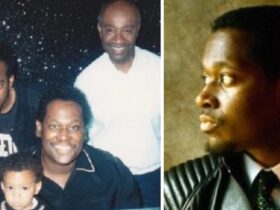Saleh Bakri is a highly respected Palestinian actor known for his remarkable performances in both Arab and international cinema. With a calm yet powerful screen presence, Saleh Bakri has become a symbol of artistic excellence, representing Palestinian stories through emotional depth and authenticity. His acting combines intelligence, empathy, and raw human feeling that captivates audiences around the world.
Quick Bio
| Full Name | Saleh Bakri |
|---|---|
| Date of Birth | March 3, 1977 |
| Place of Birth | Bi’ina, Galilee, Israel |
| Nationality | Palestinian |
| Occupation | Actor (Film & Theatre) |
| Active Years | 2005 – Present |
| Famous For | The Band’s Visit, Salt of This Sea, Wajib |
| Father | Mohammad Bakri (Actor & Filmmaker) |
| Siblings | Ziad Bakri, Adam Bakri (Actors) |
| Current Age (2025) | 48 Years Old |
| Known For | Emotional Depth & Cultural Authenticity |
Early Life and Background

Saleh Bakri was born on March 3, 1977, in Bi’ina, a village in Galilee, located within modern-day Israel. Growing up in a close-knit Palestinian community, he experienced both the beauty and the struggle of his homeland. His early environment was deeply influenced by art, storytelling, and social awareness. As a child, Saleh Bakri absorbed the cultural richness of Palestinian life, which later became the emotional foundation of his acting. His upbringing in Galilee gave him a strong sense of identity, one that continues to resonate through every performance.
Family and Heritage
Coming from a renowned artistic family, Saleh Bakri is the son of legendary Palestinian actor and filmmaker Mohammad Bakri. His father’s bold approach to cinema and theatre inspired him to pursue acting from a young age. The Bakri family is celebrated for their contributions to Palestinian culture and international film, with Saleh’s brothers, Ziad Bakri and Adam Bakri, also following in their father’s footsteps as actors.
Growing up in this environment, Saleh Bakri developed a deep appreciation for art that goes beyond performance—it became a way to preserve heritage and express identity. His family’s dedication to storytelling profoundly influenced his understanding of film as a cultural bridge between Palestine and the world.
Education and Acting Training
Before stepping into the limelight, Saleh Bakri dedicated himself to studying theatre. He completed his theatre education in Tel Aviv, where he immersed himself in acting techniques that emphasized realism and emotional truth. Theatre became his training ground—a space where he learned to channel his emotions into performance.
This strong foundation in stage acting later shaped his film career. Saleh Bakri’s training emphasized subtle expression, silence, and observation—qualities that now define his unique acting style.
Career Beginnings
Like many great actors, Saleh Bakri began his career on the stage. He performed in numerous theatre productions across Palestine and Europe, earning respect for his intense yet graceful performances. His transition to film came in the mid-2000s, marking the start of a journey that would bring him international acclaim.
His early film roles demonstrated a remarkable ability to convey complex emotions with minimal dialogue. Directors were drawn to his quiet intensity and ability to communicate meaning through expression rather than words.
Breakthrough and Rise to Fame
Saleh Bakri’s big break came with the award-winning Israeli film The Band’s Visit (2007), where he played Haled, a charming trumpet player. The film’s quiet humor and human warmth resonated worldwide, and Bakri’s performance was praised for its elegance and authenticity.
A year later, he starred in Salt of This Sea (2008), directed by Annemarie Jacir. The film, telling the story of a Palestinian-American woman’s return to her homeland, positioned Saleh Bakri as a major figure in Arab cinema. His portrayal of Emad, a man torn between love and loss, was deeply moving.
In Wajib (2017), again directed by Jacir, he acted alongside his father, Mohammad Bakri. Their real-life relationship added depth to the story of a father and son navigating family duty in Nazareth. The film received international acclaim and further cemented Saleh Bakri’s reputation as one of Palestine’s finest actors.
Filmography and Career Highlights
Over the years, Saleh Bakri has built an impressive filmography that spans independent Palestinian cinema and international projects. His notable works include:
- The Band’s Visit (2007) – Debut film that introduced him globally.
- Salt of This Sea (2008) – A politically charged drama exploring exile and identity.
- The Time That Remains (2009), directed by Elia Suleiman – A reflection on Palestinian life through poetic visuals.
- When I Saw You (2012) – A story of hope and belonging.
- Wajib (2017) – A father-son relationship layered with emotion and history.
- The Teacher (2023) – A newer project praised at film festivals for its emotional storytelling.
Throughout his career, Saleh Bakri has received multiple international film festival honors and critical recognition for portraying Palestinian experiences with honesty and sensitivity.
Acting Style and Approach
What sets Saleh Bakri apart is his natural acting style. He relies on small gestures, silent expressions, and emotional restraint to create profound impact. His performances often feel effortless, yet they carry deep layers of meaning.
Saleh Bakri combines method acting with emotional realism, allowing audiences to connect with his characters on a human level. Whether he’s portraying love, loss, or longing, his sincerity always shines through. His performances are often described as poetic—each look and movement speaking louder than words.
Age and Physical Appearance

As of 2025, Saleh Bakri is 48 years old. Known for his tall build, expressive eyes, and refined features, he possesses a magnetic screen presence that naturally draws attention. His quiet charm and dignified appearance make him ideal for complex roles that demand both strength and vulnerability.
Even off-screen, Saleh Bakri carries himself with elegance and humility, reflecting the same authenticity that defines his acting career.
Personal Life and Relationships

Despite being a public figure, Saleh Bakri is known for his private lifestyle. He rarely discusses his personal relationships or family in interviews, preferring to keep the focus on his work and cultural mission. His humility and quiet nature distinguish him in an industry often driven by publicity.
However, those who have worked with him describe him as compassionate, grounded, and deeply committed to his craft. Saleh Bakri has mentioned that his relationship with his family—especially his father and brothers—remains one of his greatest sources of strength and artistic inspiration.
Cultural Identity and Advocacy
As a Palestinian actor, Saleh Bakri views cinema as a tool for cultural preservation and resistance. Many of his film choices reflect stories of displacement, identity, and freedom. Through his art, he gives voice to everyday Palestinians and challenges stereotypes in global media.
He often collaborates with Palestinian and Arab filmmakers who focus on authentic storytelling. Saleh Bakri believes that acting is not just entertainment—it is a way to speak truth through art and bridge the gap between different cultures.
Achievements and Global Recognition
Over his two-decade career, Saleh Bakri has been celebrated at international film festivals including Cannes, Venice, and Dubai. Critics consistently praise his nuanced performances, and he has become a respected figure among global filmmakers.
His work in Wajib and Salt of This Sea earned widespread acclaim, showcasing him as an actor who can blend artistic sensitivity with political awareness. Through his films, Saleh Bakri has helped elevate Palestinian cinema to the world stage.
Legacy and Influence
Beyond awards and fame, Saleh Bakri’s greatest legacy lies in how he has inspired a new generation of Palestinian actors. Young artists view him as a mentor figure whose integrity and artistry prove that meaningful cinema can transcend borders.
He remains a cultural ambassador for Palestine, using every role to shed light on stories often left untold. Saleh Bakri’s work reminds audiences that art has the power to create understanding, compassion, and change.
Conclusion
From the quiet streets of Bi’ina to the global stage, Saleh Bakri has built a career grounded in honesty, artistry, and cultural pride. His performances capture the heart of Palestinian life—its resilience, beauty, and humanity.
Even at 48, Saleh Bakri continues to evolve as an actor and storyteller. His dedication to truth in performance ensures that his influence will last for generations. In every sense, Saleh Bakri is more than just an actor—he is a voice for identity, justice, and the enduring spirit of Palestine.
FAQs
Who is Saleh Bakri?
Saleh Bakri is a renowned Palestinian actor known for his roles in international and Arab cinema, celebrated for his emotional depth and authenticity.
When was Saleh Bakri born?
He was born on March 3, 1977, in Bi’ina, Galilee, Israel, into a family deeply rooted in Palestinian arts.
What is Saleh Bakri famous for?
He gained fame through acclaimed films like The Band’s Visit, Salt of This Sea, and Wajib.
Who are Saleh Bakri’s family members?
He is the son of actor Mohammad Bakri and brother to actors Ziad Bakri and Adam Bakri.
How old is Saleh Bakri now?
As of 2025, Saleh Bakri is 48 years old and remains active in both theatre and cinema.
What is Saleh Bakri’s acting style?
He is known for his natural, expressive acting, focusing on emotional realism and quiet strength.
Has Saleh Bakri won any awards?
Yes, he has received multiple international film festival honors for his contributions to Palestinian cinema.
Is Saleh Bakri married?
He keeps his personal life private, focusing mainly on his artistic work and cultural projects.
What does Saleh Bakri represent in cinema?
He represents Palestinian identity and resilience, telling stories that reflect his people’s experiences.
What is Saleh Bakri doing today?
He continues to act in international films, promote Palestinian cinema, and inspire new generations of artists.
For More Updates Visit: Biomagazine












Leave a Reply